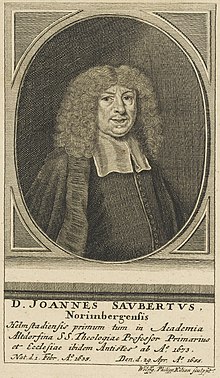Johannes Saubert the Younger
Johannes Saubert the Younger ( Latinized Johannes Saubertus ; born February 1, 1638 in Nuremberg ; † April 29, 1688 in Altdorf near Nuremberg ) was a Lutheran theologian and orientalist .
Life
Johannes Saubert, born and raised in Nuremberg as the son of the theologian and city librarian Johannes Saubert the Elder . Johannes Saubert the Elder J. began his theological studies at the University of Altdorf , which he continued in Jena from 1657 to 1659 . On October 27, 1659, he enrolled at the University of Helmstedt and received there on December 24, 1660, not yet 23 years old, a full professor of oriental languages . As a successor to Georg Calixt , he got a theological professorship on November 10, 1665, for the subject of the Old Testament .
On January 14, 1673, Saubert received his doctorate in theology in Helmstedt. In the same year he was offered a professorship in theology at the University of Altdorf from his home town of Nuremberg . At the same time he was supposed to take over the office of superintendent there . Saubert was prepared to stay in Helmstedt if they wanted to promise him the union of the two professorships for Oriental languages and the Old Testament for life. Since this was not answered, he moved to Altdorf, where he died on April 29, 1688.
Act
At the suggestion of Duke August II of Braunschweig-Wolfenbüttel , with whom he had been correspondence since 1663, Saubert began a new, linguistically accurate translation of the Bible into German around 1664 . The translation was printed in parts, but never published as a complete work and is therefore only available in a few copies. The manuscripts used for printing are in the Herzog August Library in Wolfenbüttel .
Hermann Conring , Saubert's father-in-law, opposed the widespread , negative public reception of the translation in a paper published in 1666 ( Epistula Gratulatoria ). After the Duke's death (September 17, 1666), Saubert obtained from the subsequent Duke Rudolf August that he was ordered to continue the work.
Fonts
- De sacrificiis veterum; conlectanea historico-philologica et miscella critica; quibus accedit ejusdem De sacerdotibus et sacris Hebraeorum personis commentarius singularis. Jena 1659.
- The Holy Scriptures of the Old Testament; By order of Augusti, Duke of Braunschweig and Lüneburg, Germanized from the basic Hebrew language by Joh. Saubertum. Helmstedt 1666.
- Renewed church devotion written in five reflections and presented to the congregation in Altdorf publicly. Nuremberg 1674.
- The H. Apostle Pauli golden prayer art. Altdorf 1674.
- Great difference in the nature of the bodies of the pious and believers here in this time and there in eternity. Altdorf 1679.
literature
- Elke Niewöhner: Saubert, Johannes (d. J.) . In: Horst-Rüdiger Jarck , Dieter Lent et al. (Ed.): Braunschweigisches Biographisches Lexikon - 8th to 18th century . Appelhans Verlag, Braunschweig 2006, ISBN 3-937664-46-7 , p. 610 f .
- Paul Zimmermann : Saubertus, Johannes . In: Allgemeine Deutsche Biographie (ADB). Volume 30, Duncker & Humblot, Leipzig 1890, p. 415 f.
- Michael Welte: SAUBERT, Johannes. In: Biographisch-Bibliographisches Kirchenlexikon (BBKL). Volume 30, Bautz, Nordhausen 2009, ISBN 978-3-88309-478-6 , Sp. 1209-1214.
Web links
- Literature by and about Johannes Saubert the Younger in the catalog of the German National Library
- Works by and about Johannes Saubert the Younger in the German Digital Library
- Publications by and about Johannes Saubert the Younger in VD 17 .
| personal data | |
|---|---|
| SURNAME | Saubert, Johannes the Younger |
| ALTERNATIVE NAMES | Saubert, Johannes d. J .; Saubertus, Johannes |
| BRIEF DESCRIPTION | Lutheran theologian and orientalist |
| DATE OF BIRTH | February 1, 1638 |
| PLACE OF BIRTH | Nuremberg |
| DATE OF DEATH | April 29, 1688 |
| Place of death | Altdorf near Nuremberg |
